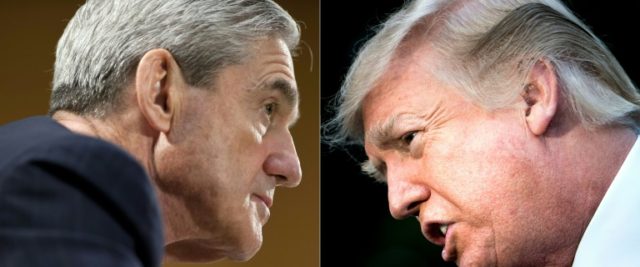Washington (AFP) – Special Counsel Robert Mueller wants to interview Donald Trump, and his questions indicate he is probing what the US president knew of frequent contacts between his election campaign and Russia, and whether he tried to obstruct the investigation.
But so far Trump has resisted, and his lawyers are already signalling a possible showdown over his constitutional powers. The apparent Plan B from the White House is to convince voters — and Congress — that Mueller’s investigation is an illegal witch hunt.
– Does Trump have to speak to investigators? –
Not absolutely. Since George Washington, US presidents have invoked executive privilege to protect confidential information involving White House business.
In 1974, special Watergate prosecutor Leon Jaworski sued president Richard Nixon to obtain tapes of White House conversations. In a landmark unanimous ruling, the Supreme Court said executive privilege has limits, and that Nixon had to release the tapes because they contained important evidence in a criminal proceeding. The tapes proved deeply damaging and, facing impeachment, a month later Nixon resigned.
“Executive privilege is contestable,” said Mark Rozell, dean of the Schar School of Policy and Government at George Mason University and author of a book on the issue.
“Even though the president has secrecy rights, and may claim under certain circumstances executive privilege, that power has to give way to the needs of criminal justice in an investigation of possible high-level wrongdoing.”
– What are the risks for Trump? –
Mueller has the upper hand, legal experts say. He can demand a face-to-face interview with the president, with Trump’s attorneys present. The Washington Post reported Wednesday that Mueller has already threatened a more severe alternative: a subpoena for Trump to testify in front of a grand jury, without the lawyers.
For a president with a penchant for speaking his mind, face-to-face questioning with Mueller, a tough former prosecutor and ex-FBI director, is fraught with risks. Trump could easily be caught lying, or reveal new information damaging to himself.
Indeed, his lawyers have already floated the idea that the Mueller interview is an attempt to catch the president out. On Wednesday Trump himself tweeted that the obstruction investigation is “a setup & trap”.
But faced with a subpoena, the lawyers could pursue a compromise, as in president Bill Clinton’s 1998 perjury case.
Then, special prosecutor Ken Starr subpoenaed Clinton to testify in front of a grand jury over the allegation that Clinton had lied under oath about having sex with Monica Lewinsky.
Not prepared to fight the subpoena, Clinton offered to answer Starr’s questions directly, with his lawyer present but without the grand jury. In a compromise, Starr agreed to Clinton testifying under oath to the grand jury from the White House by video, with his lawyers present.
– Can Trump refuse to testify? –
Trump can still refuse to testify, claiming presidential immunity. That could force Mueller to sue the White House, and the case could head to court, where the Nixon ruling would loom large.
“The precedent is pretty terrible for the president’s position,” said Andrew McCanse Wright, an associate professor at Savannah Law School.
Wright points out that Trump has already liberally spoken about details of the Russia case, arguably undermining his claim of privilege.
Trump can also refuse to speak claiming his Fifth Amendment right not to incriminate himself.
“But it would be a disaster politically,” leading the public to assume Trump’s guilt, said Wright.
What if Trump still refuses?
“It will be up to Congress at that point, whether to impeach the president,” said Rozell. “At that point, I think it could get really ugly.”
– What is Trump’s strategy? –
The White House has yet to officially rule out Trump answering Mueller’s questions in one form or another. But analysts say Trump appears to be preparing for the worst case, a possible impeachment battle in Congress.
There he would need the entire Republican majority on his side to survive in office. By branding the Mueller probe a politicized “witch hunt”, Trump and Republican supporters are already trying to shore up their defenses.
“This isn’t about ‘the law’ anymore,” said Bradley Moss, a Washington national security lawyer at the law office of Mark S. Zaid, P.C.
“The president seems well aware that his political future rests in holding the line in the Senate and avoiding conviction by that body in the context of impeachment.”
“The strategy has been for the last few months — and appears likely to remain — a focus on discrediting the integrity of the investigation,” he said.
“So that no matter what Mueller ultimately finds or concludes there is no way the president’s political base will ever accept it.”
In the meantime, the White House confirmed Wednesday that Ty Cobb, Trump’s lead lawyer in dealing with the Mueller probe, is stepping down — the latest in a series of departures from the president’s legal team as it debates whether Trump should agree to be interviewed.
He is reportedly to be replaced by Emmet Flood, a Republican defense lawyer who represented Clinton during his impeachment proceedings.

COMMENTS
Please let us know if you're having issues with commenting.